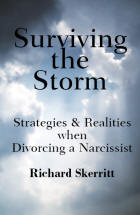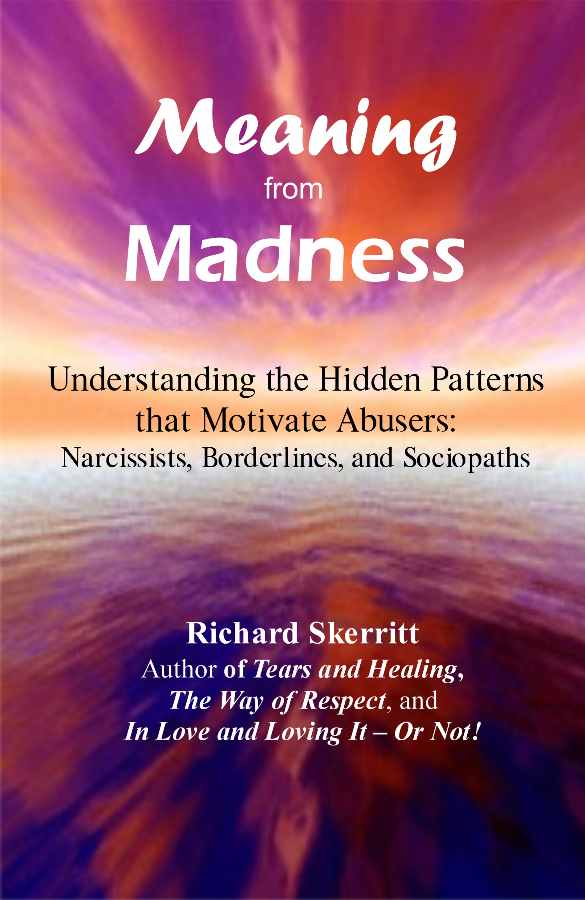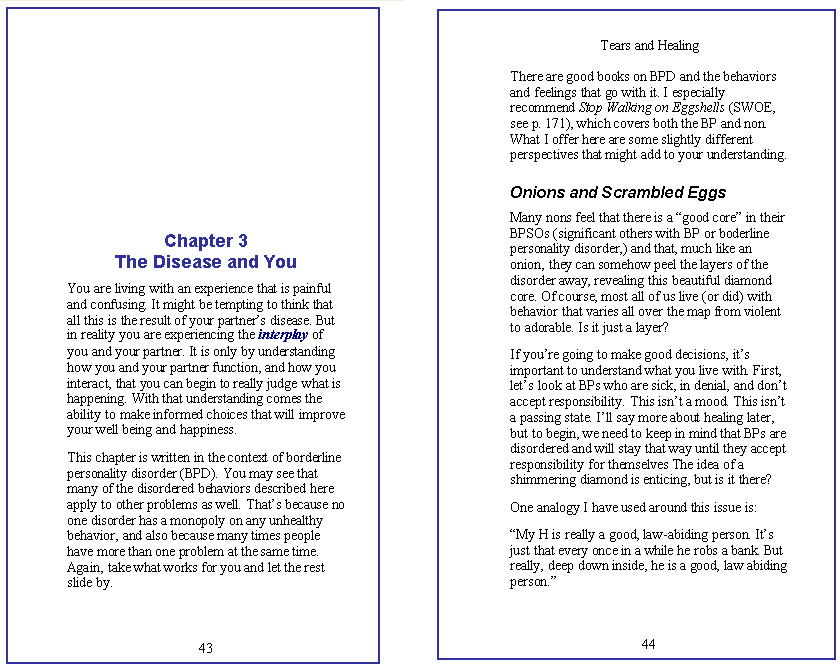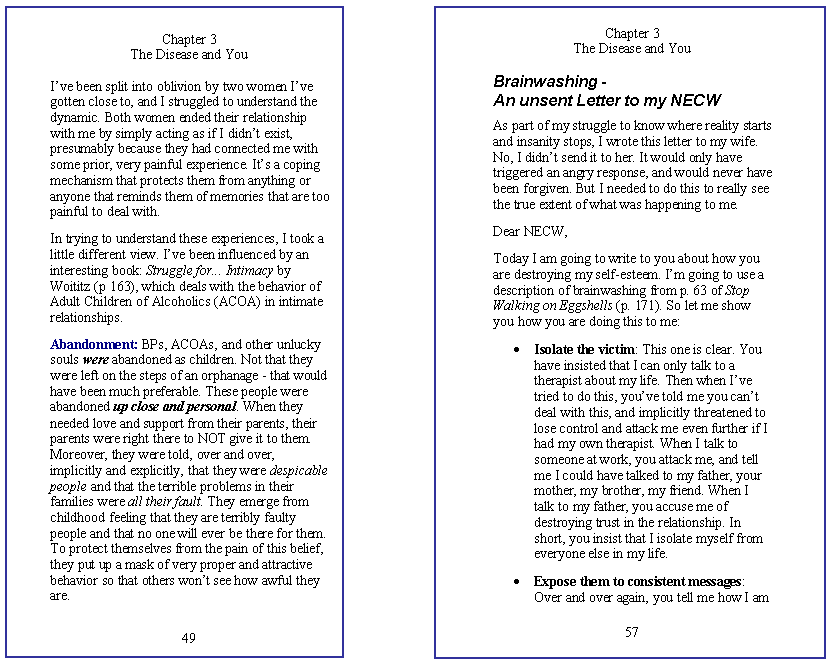Are you Codependent?-
Overcome the love locking you in.
Find the Courage to Leave.
Are you codependent? Have you been convinced that there is something
fundamentally wrong with you? What does codependence really mean?
We end up in abusive and unhealthy situations for lots of reasons. Moreover,
we often stay in them for reasons that are healthy, even though the situation
isn't. Some people want to tell us that is were are in an unhealthy situation we
must be "codependent". The problem is, it's not true. What's more,
"codependence" isn't a defined problem that we directly address. It sells books,
but does it help us?
So ask some of these questions of yourself: Did your relationship start out
in a positive way? Did your partner change after you were in a committed
situation, where it was difficult to just break things off? Have you held a
reasonable hope that things will improve? Does your situation make you
sick, and make you wish for a safer and healthier relationship? Are you putting
up with bad treatment for a higher purpose, like trying to make the best home
for your children?
If you answer yes to these questions, then you should feel that you are
coping with a difficult situation that you did not create. Don't paint yourself
with the amorphous label that you're "codependent". Recognize that
although your
situation is unhealthy, there may be no simple options to make it
better. Just because you're weighing the balance and hanging in there doesn't
mean there's something fundamental wrong with you. You may have hard work ahead
to make your life better, and you may be facing some difficult choices and
changes, but that doesn't make you "codependent."
The truth is that in many cases abusers really do make victims of
otherwise innocent people. Their behavior early in the relationship may be
wonderful, and it often stays that way until a lasting commitment is made. Then
things change for the worse, often dramatically. This "now you see it, now you
don't" phenomenon is common with people who have narcissistic defenses, and I
talk about this in Meaning from Madness (to the right.) Once we're
married, and even worse have children, there aren't' any simple ways to put an
end to the abuse, because such major sacrifices must be made to force change.
This isn't codependence. It's a painful and difficult situation that we need
help to deal with.
Overcome the Love Locking You In
Many of us got into unhealthy situations because our partners held up a
facade. Many of us felt or thought that we had met our soul mate; found the
perfect partner; met that one special person in the universe. It's no surprise
that we can fall in love with someone like this!
Later, usually after we've made a binding commitment like marriage, or
sometimes after the relationships changes due to children being born, job
changes, or other major life changes, our partner shows a completely different
side. The person who was once perfect now can become angry, demeaning,
demanding, and harshly critical. I talk about this dynamic in my book on
disordered behavior, Meaning from Madness. From someone we have deep
feelings for, these actions are brutal. Yet we may still have strong feelings of
love pulling us to that person. Talk about being torn!
At some point, many of us realize this situation needs to change, but
feelings are not chosen. How can you overcome the love that pulls you to someone
who is abusing you?
While you can't turn those feelings off like a switch, you can learn to
understand where those feelings come from, and how our minds create them, and
then set the stage for new feelings to develop - hopefully toward someone who's
better for us. At first this issue was a chapter in my book, Tears and Healing,
but it was so important it eventually became its own short book, In Love and
Loving It - Or Not! The really sad part is that our minds create these
feelings so that we'll be motivated to engage in a relationship that meets our
emotional needs, yet those same feelings can end up locking us in, pulling back
again into a broken relationship that just can't fill those needs! Its like a
trap, one that we need new understanding to get out of.
Find the Courage to Leave
As someone who spends a lot of time helping other people, I never presume to
judge or tell people what they "should do", "have to" do, or "need" to do. These
are individual choices that can only be made by the person who must live them.
But when people are ready to make a change, they can often be trapped not just
by their love for their hurtful partner, but by fear. Ending major relationships
means big changes, changes in where and how we live, what we own, how much money
we have, whether we're alone or not. Its natural to be afraid. Its sometimes
like leaping off a cliff in the dark.
Fortunately, fear stands on base that is easy to chip away at:
ignorance. We are most often afraid because we don't know what will happen.
Without any specific thoughts, our minds love to wander off into all kinds of
extreme outcomes - things that really just aren't going to happen. So overcoming
fear - finding the courage to make changes - is about learning. It can take
time, and it does takes little bits of courage to ask the questions, but if we
chip away at it, we can build a picture or what a new life will be like, and we
can fill that picture with facts and not imagined fears. Those facts, and that
true vision of what we'll do and what things will be like, undercut the fears
and make it possible to face the change.
Stopping the hurt; Healing the Damage -
Dealing with this
situation is complex, and people need some idea of "What do I do now
that I know this?" For most people, there are important values, beliefs and
obligations that have to be carefully thought about. Most people who asking "Am
I codependent?" are in very hurtful situations, and significant decisions have to be faced, then
resolved. Tears & Healing holds a
light up in this dark place. Written from the inside perspective of someone who
has been through the hell of being emotionally and verbally battered by a
spouse, this book addresses the major issues that we all must wrestle with.
Tears & Healing begins with the most difficult issue: abusive partners constantly work to distort
our perception of what is happening and what is right and wrong, until we doubt
our own judgment so much we can't make decisions. It then addresses the process of
detaching to find safe space and to regain a sense of right and wrong, and searching
to understand what we, as people, need in our lives - needs that often must be
simply put aside to survive in these brutal situations. It deals with love, and the
conflict of being in love with someone hurtful to us. And it addresses the
intense feelings of obligation that many of us have, which keep us locked in
situations that are beyond what any person should endure. Tears & Healing is an
intensely personal and validating guide through this maze of thoughts and
emotions. The reader reviews below can give you some sense of how liberating
Tears & Healing has been for many, many people.
As I said already, dealing with feelings of love is a huge barrier for many. My
book,
In Love and
Loving It - Or Not! , addresses these issues. It explains how and why we
fall in love; what we can do to get out of love with someone hurtful to us; how
we can make choices so we are more likely to fall in love with someone good for
us; and how being in love relates to the different, chosen actions of loving.
Many of the people I help to deal with their abusive situations need this kind
of guidance.
My experience also shows that most of us need a solid understanding of what is going on in our partners.
They are usually disordered, and when we can understand what disorder is in
play, we can start to understand why they do what they do, and what the
prospects are for change. My newest book, Meaning from Madness, deals
with this (on the right.)






